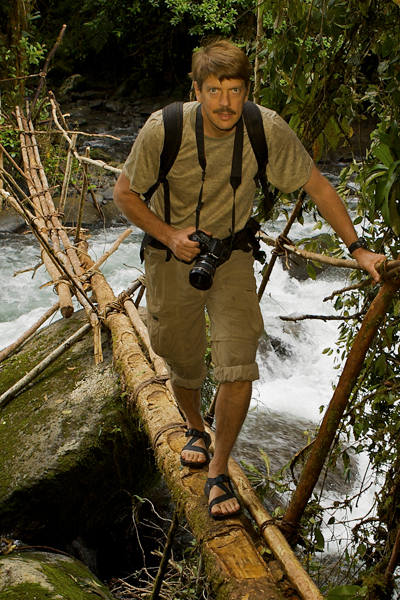Tim Laman uncovers the secret life of birds
|
|
|
A field portrait of Tim Laman |
In the field, Laman works carefully in order to avoid disturbing the wildlife. He hires local villagers to help his team carry their equipment into the mountains and assist him in becoming familiar with the area. He can spend days or weeks trying to find the perfect tree to observe a particular bird and take quality pictures. For some shots, Laman has to climb trees up to 50 meters high in order to find a bird displaying a particular habit. Once the location is selected, he camouflages his camera using leaves from the jungle. For shots taken high in the trees, he might use a remote-control camera and hide in a leaf-covered hut on the ground where he follows the birds on another monitor.
Climbing trees or hiding in the sweltering rainforest's foliage seems like an uncomfortable environment for work, but Laman says he doesn't think about the hardships. "As a field biologist, you expect to suffer a bit in the field, you don't tend to make a big deal about it," he says.
His project also carries a clear message of conservation: while the birds of paradise live hidden deep in the rainforest, they still face the dangers brought by a developing world. New Guinea is facing pressure to increase its logging and mining industry, and the birds have long been victims of hunting.
Furthermore, there are no officially protected national parks; all the land where Laman conducted his studies belongs to local villages. "We're really hoping that this project can help to promote awareness about New Guinean rainforests." Laman explains. "We hope the spectacular birds there will be our flagship species to get more attention for this area."
There is hope for change; at least one village has elected to end their hunting practices in favor of protecting the forests and attempt to attract visitors. According to Laman, the prospect of eco-tourism could be a huge boost to the wildlife; villages would have an incentive to protect the wildlife and the opportunity to make money. "There's a small but growing number of bird watchers and travelers who want to see birds of paradise and other wildlife," he says. "That's one of the biggest ways this work could help promote conservation in the area: it could motivate more people to go and see the birds."
These little-known birds could have easily passed out of existence without much human knowledge of their lifestyles, but Laman's work is bringing their beauty and exotic habits to millions who would otherwise never have the opportunity to see these birds in their natural surroundings in New Guinea. With the work of Laman and other conservationists, these rare animals may have a chance at having their paradise preserved.
 0
0 







